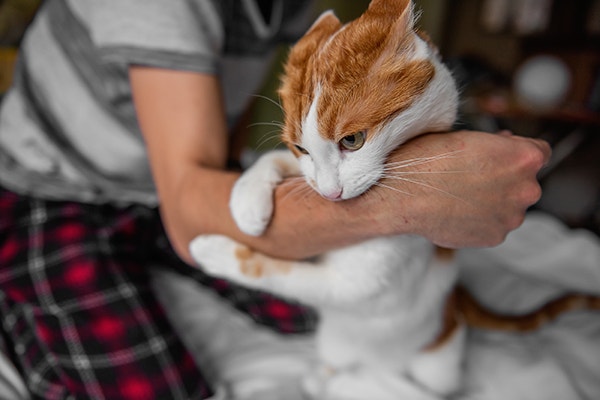- Homepage
- Blog
- Bonding & Care
- Do Cats Know Their Names
Do Cats Actually Know Their Names?


Share
Naming a cat feels like the first step in welcoming them into your life. But many pet parents still wonder: do cats know their names in the way we think of names? Research suggests cats can distinguish their own names from other words, but recognition doesn’t always mean they’ll respond. Unlike humans, cats don’t understand the abstract concept of a “name”; instead, they associate certain sounds with experiences, rewards, or affection.
For new owners preparing to get a new kitten, understanding how cats relate to their names can help build trust and strengthen bonds from the very beginning.
Do cats recognize their names?
Studies confirm that cats do learn their names and can tell them apart from other similar-sounding words. This ability comes from recognising patterns in tone and sound rather than understanding a name as humans do.
Cats quickly associate their name with consistent outcomes, such as mealtime, affection, or playtime, which reinforces recognition. Still, recognition and response are not the same thing. A cat may hear you but choose not to respond, which is why many owners wonder if cats respond to their names at all. The key is building positive associations.
If calling your cat often leads to treats, attention, or gentle play, the name becomes meaningful. This is also where learning how to teach a cat its name effectively can make a difference, especially for shy or independent pets. Using calm repetition, rewards, and encouragement strengthens that link. Over time, it becomes easier to see if cats know their names by watching how they react when you call, whether through a head turn, approach, or other subtle signals.
Why do cats respond differently from dogs?
Dogs and cats have very different histories of domestication, which explains why their behaviour around names isn’t the same. Dogs were selectively bred to follow human commands and thrive on cooperation, which makes them naturally responsive.
Cats, however, developed alongside people while keeping much of their independence. They may recognise your voice and even their name, but whether they respond is often a matter of choice. While research shows that cats do recognise their names, it still doesn’t guarantee instant obedience or a response to calls. Unlike dogs, cats weigh up their mood, environment, and motivation before reacting, which is part of their unique charm.
Why do cats sometimes ignore their names?
If your cat doesn’t come running when called, it doesn’t mean they don’t know their name. Cats are independent by nature and may be distracted, uninterested, or simply resting. This is why pet owners often wonder, “do cats respond to names consistently?”
Studies show that most cats usually recognise the sound of their name, but may choose not to act on it. Factors such as mood, timing, or even being mid-nap can all influence their decision. Remember, ignoring isn’t the same as failing to recognise. Patience and positive reinforcement, like treats, toys, or affection, are key when learning how to teach a cat its name most effectively.
Signs that your cat knows their name
It’s not always obvious when a cat is responding to their name, because they rarely show it in the same enthusiastic way as dogs. Cats are quiet, but telling signs reveal that cats do learn their names and respond to familiar sounds. Remember, their body language tells the story. Look for cues such as:
- An ear twitch or head turn when their name is spoken.
- Eye contact that lingers for a moment.
- Approaching you, even if slowly or on their own terms.
- A tail flick or slight shift in posture.
Together, these behaviours suggest that cats do know their names aren't really in doubt; they recognise the sound, even if their response varies. By paying attention to these minor signs, owners can feel more confident that their cat is listening. Although cats react more subtly than dogs, these gentle cues show they do recognise their name, even if their responses are uniquely feline.
How to teach a cat its name
Learning how to teach a cat its name is a gradual process that works best with patience, consistency, and positive reinforcement. Start in a quiet space, free from distractions, then say your cat’s name clearly and immediately follow with a reward. Your approach could be gentle praise, playtime with a favourite toy, or a small serving of Sheba® products. The key is to build a positive association with the sound of their name.
Keep training sessions short, around five minutes at a time, and repeat them a few times each day. Cats respond best when their name is used consistently and linked to enjoyable experiences. Avoid using their name when you’re frustrated or about to do something they dislike, such as giving medicine, so it never becomes a negative trigger or association.
Some cats also benefit from clicker training. The process is simple: say their name, click, and reward. Over time, your cat will learn to connect the sound of their name with positive outcomes. Remember, while dogs often respond eagerly, cats move at their own pace. Whether you’re wondering if cats do know their names, with gentle persistence and rewards, your cat will learn to recognise and respond.
Can cats learn other words too?
Cats are more perceptive than we often realise. Many learn to recognise words such as “treat,” “dinner,” or “bed” by linking the sound with a consistent routine or reward. This ability highlights how their intelligence, memory, and daily habits work together. Just like exploring how to teach a cat its name for the first time, cats respond best when words are initially reinforced with positive experiences.
Encouraging your cat to recognise familiar terms not only supports smoother communication but also provides valuable mental stimulation. Teaching simple cues can enrich their environment, reduce boredom, and strengthen your connection and caring for your cat.
Do cats know their names - FAQs
Do cats know their names?
Yes, cats do know their names. Studies show that you can help recognise the sound through association with positive experiences, such as treats, play, or affection. While cats may not respond every time, consistent use helps them understand and remember their name and can strengthen the bond with your cat.
Do cats like when you say their name?
Cats may enjoy hearing their name if it’s linked to something positive, like using their name in playful and affectionate moments. Tone matters: a gentle, friendly voice encourages engagement, while a harsh tone may cause them to retreat.
Why do cats ignore you?
Cats do respond to names, but they can often ignore calls when they’re focused, relaxed, or simply independent. Even if they know their name, their mood or surroundings affect responsiveness. Patience, consistency, and rewarding attention can improve how often they acknowledge you.
What names do cats hear best?
Cats respond most easily to short, clear names with distinct consonants and vowels. Repetition and consistency help them recognise the sound, indicating that cats respond to their name over time. Using simple, sharp syllables improves recognition and encourages a reliable response during daily interactions.











